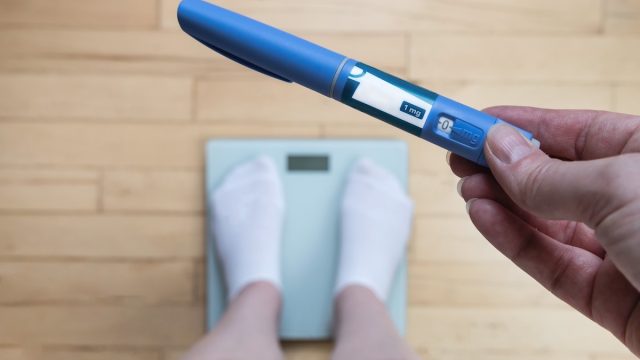Surgery Leads to 5 Times Greater Weight Loss Than Ozempic, New Research Reveals
Studies show that clinical estimates of weight loss associated with GLP-1 drugs are overestimated.

GLP-1 weight-loss drugs like Ozempic and Wegovy have been hailed as nothing short of miracle workers for their ability to help people shed pounds quickly and efficiently. These injectable medications have surged in popularity so much that it’s estimated that 12 percent of U.S. adults have tried such a drug. At the same time, and likely because of this, data shows that demand for bariatric surgery has plunged, dropping nearly 26 percent in 2023.
However, new research is challenging this trend, as data shows that metabolic and bariatric surgery leads to five times greater weight loss than GLP-1 drugs in a head-to-head comparison.
RELATED: Ozempic and Wegovy May Have Landed 25,000 People in the ER—Here’s the Scary Reason Why.
Weight-loss surgery is “superior” to GLP-1 drugs.
According to new research presented at the American Society for Metabolic and Bariatric Surgery (ASMBS) 2025 Annual Scientific Meeting, sleeve gastrectomy and gastric bypass surgeries were associated with five times more weight loss than weekly injections of GLP-1 receptor agonists after a two-year follow-up period.
These results apply to both semaglutide—the active ingredient in Ozempic (approved to treat diabetes but often prescribed off-label for weight loss) and Wegovy (approved for weight loss)—and tirzepatide—the active ingredient in Mounjaro (approved for diabetes) and Zepbound (approved for weight loss).
To arrive at these findings, researchers from NYU Langone Health and NYC Health + Hospitals looked at the medical records of 51,085 patients who had either bariatric surgery (sleeve gastrectomy or Roux-en-Y gastric bypass) or were prescribed injectable semaglutide or tirzepatide between 2018 and 2024, according to a press release. At the onset, the patients all had a body mass index (BMI) of at least 35, which falls into the obesity range.
After two years, the scientists observed the following:
- Bariatric surgery led to an average weight loss of 58 pounds, or 24 percent of body weight
- GLP-1 drugs taken for at least six months led to an average weight loss of 12 pounds, or 4.7 percent of body weight
- GLP-1 drugs taken for one year led to an average weight loss of 7 percent of body weight
RELATED: Inflatable Gastric Balloons May Be the New Frontier in Weight-Loss, Research Shows.
Surgery may offer a more long-term solution to weight loss.
“First and foremost, the high cost of these therapies is likely a large barrier,” he said in a statement at the time. “Also, unlike therapies that are used to treat blood pressure or cholesterol, the perception that these are not chronic disease therapies may also be contributing. For instance, some individuals think they will stop taking them once they’ve lost weight while others are only using them cosmetically and not for management of a chronic disease.”
This is especially noteworthy because the ASMBS shares that roughly 270,000 metabolic and bariatric procedures were performed in 2023, which accounts for only 1 percent of Americans whose BMIs qualify them for the surgeries.
“While both patient groups lose weight, metabolic and bariatric surgery is much more effective and durable,” said ASMBS President Ann M. Rogers, MD, FACS, FASMBS, who was not involved in the study. “Those who get insufficient weight loss with GLP-1s or have challenges complying with treatment due to side effects or costs, should consider bariatric surgery as an option or even in combination.”
RELATED: Doctor Says Ozempic Raises Certain Health Risks by Up to 900%.
Bariatric surgery also causes fewer psychiatric side effects.
Another body of research presented at the ASMBS 2025 Annual Scientific Meeting found that psychiatric disorders are less likely after weight-loss surgery than treatment with GLP-1s.
For this study, researchers looked at the health data of 33,600 patients who underwent either metabolic or bariatric surgery, and 33,600 patients who were prescribed a GLP-1 agonist, including semaglutide, liraglutide (Saxenda), and dulaglutide (Trulicity). After a five-year follow-up period, they observed the following in the surgery group:
- 54 percent lower risk of developing cognitive deficits
- 18 percent lower risk of anxiety disorders
- 17 percent lower risk of substance use disorders
“The data supports embedding psychiatric screening and support within both surgical and medical obesity programs to help reduce the potential mental health burden after treatment,” said study co-author Shauna Levy, MD, Assistant Professor, Chief, Division of MIS/Bariatric Surgery, Tulane University School Medicine, in a press release. “Further investigation is needed, however, to determine why the psychological impact is so different between treatment modalities.”
RELATED: Certain Foods Trigger Natural Ozempic-Like Weight Loss Effect, Doctor Says.
The takeaway:
New research suggests that clinical estimates of weight loss associated with GLP-1 drugs are overestimated.
In real-world scenarios, data shows that metabolic and bariatric surgeries lead to five times greater weight loss than these drugs. Surgery also significantly reduces the risk of psychiatric side effects, as compared to weight-loss drugs.
“In future studies we will aim to identify what healthcare providers can do to optimize GLP-1 outcomes, identify which patients are better treated with bariatric surgery versus GLP-1s, and determine the role out-of-pocket costs play in treatment success,” said study senior author and bariatric surgeon Karan R. Chhabra, MD, Assistant Professor of Surgery and Population Health, NYU Grossman School of Medicine.





















